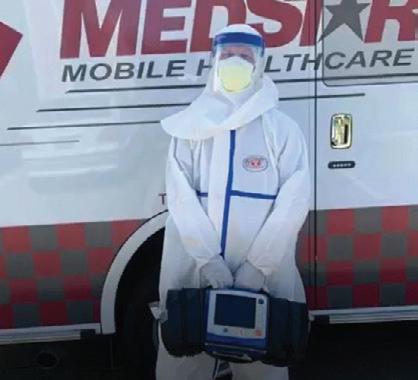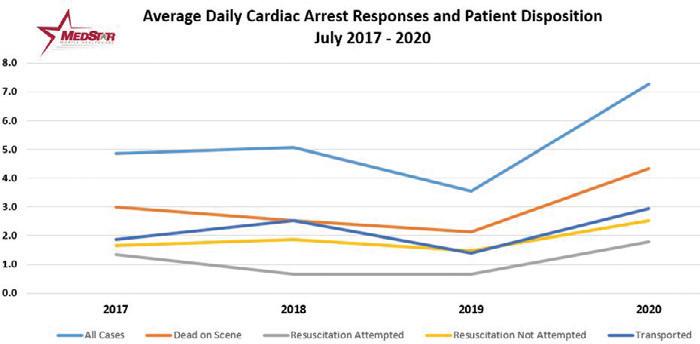
5 minute read
Medstar Mobile Healthcare
MedStar Mobile
HEALTHCARE
Advertisement
MEDSTAR’S COVID-19 RESPONSE
The COVID-19 pandemic has changed the world, perhaps for years to come. Locally, the pandemic’s impact has been profound, on both area residents and front line healthcare workers, including MedStar.
MedStar is the governmental emergency medical services provider created and owned by the City of Lake Worth and 14 other member cities. You surely see their ambulances on standby in Lake Worth, pre-positioned awaiting an emergency response, or even noticed their Community Paramedics out in our community helping residents with complex medical issues effectively manage their healthcare needs to potentially prevent an emergency medical need.
Here are some of the ways MedStar operations changed during the pandemic.
ENHANCED CALLTAKING PROCESSES
Keeping first responders safe is a primary role for MedStar’s medical 9-1-1 call center personnel. Using an internationally developed “Emerging Infectious Disease Surveillance” protocol, which was locally approved by the EMS System’s Medical Director and member cities, 9-1-1 call takers started enhanced call screening of all 911 medical calls starting March 21st. This screening identifies patients who may have illnesses consistent with COVID-19 to alert first responders prior to their arrival at the scene. This facilitates a special on-scene process to minimize exposure risk to responders. While it adds an average of 1 minute, 49 seconds to the call taking process, the member city first responders felt this was an important safety mechanism for responders. An average of 55 calls per day receive this enhanced call taking process.
PERSONAL PROTECTIVE EQUIPMENT
Personal Protective Equipment (PPE) was in very short supply at the start of the pandemic, and to a large extent, those shortages have yet to be fully alleviated. To preserve PPE and provide effective patient care, MedStar and member city first response leaders, including Chief Mike Christenson from Lake Worth, developed special on-scene protocols and procedures to minimize the number of personnel actually engaged in patient care for patients identified as at highrisk for a COVID-19 infection. This not only helped ensure personnel safety, but also helped preserve PPE during the PPE shortage.
PATIENT NAVIGATION VS. PATIENT TRANSPORT
In preparation for a predicted surge of hospitalizations for patients suffering from COVID-19, the EMS system Medical Director implemented a special protocol for patients with low-acuity medical complaints consistent with the coronavirus. After assessment, patients are informed that they will not be transported by ambulance to an emergency department (E.D.) but rather provided with verbal and written instructions on how to access healthcare resources other than an E.D. for their medical needs and ways to stay safe at home. This protocol significantly reduces ambulance transports and preserved hospital capacity for higher acuity patients. Between March and August 2020, this protocol was utilized on 533 patients.
COVID-19 TESTING
In partnership with Tarrant County Public Health (TCPH), MedStar conducts drive-thru COVID-19 testing at their headquarters in west Fort Worth for people referred by
TCPH for testing, generally healthcare workers and first responders who needed to be rapidly tested in order to determine their ability to return to work. Additionally, MedStar’s Community Paramedics do in-home COVID-19 testing for people referred by TCPH who may not be able to or should not leave their residence for testing.

HEALTHCARE FACILITY ASSESSMENTS AND TRAINING
Working with the Texas Health and Human Services Commission and TCPH, teams of MedStar personnel visit healthcare facilities, such as skilled nursing and assisted living facilities to assess infection control processes, train personnel in the proper use of PPE, and conduct COVID-19 testing for residents and facility staff. This service has recently been expanded to include area businesses as well.
OTHER PANDEMIC IMPACTS Personnel
Potentially due to people not seeking medical care during the pandemic, in July 2020, MedStar’s response volume for patients in cardiac arrest (heart has stopped beating) was 65% than July 2019. This led to MedStar partnering with the Dallas/Fort Worth Hospital Council, and others, to educate our community members on the risks of delaying medical care. This increase in high-acuity responses also took a toll on first responders and MedStar personnel.
Economic Impact to MedStar
“Stay at Home Orders” had a profound impact on MedStar’s response and transport volume. This summer, MedStar’s response volume was down 18.6% and transport volume down 28.0%. Fewer ambulance responses and transports are generally a good thing, as it means that fewer people need an EMS response. The economic challenge is that MedStar relies on fees from services to finance the cost of operations. Reduced revenues from patient services, combined with dramatic cost increases for things like PPE and personnel expenses, had an overall $5.5 million negative impact on MedStar’s finances. Thankfully, Lake Worth, and other member cities, allocated portions of their federal coronavirus stimulus payments to assist MedStar with some economic relief for the additional operational expenses related to the pandemic. Long-term mitigation strategies being considered by MedStar’s public board may include the potential for an ambulance rate increase for the first time in more than a decade.

WHAT’S NEXT?
As the nation moves closer to a potential COVID-19 vaccine, MedStar is preparing to be part of the vaccine administration strategy. TCPH and others have already begun the plans to include MedStar and potentially other first response EMS personnel as a key component of effective vaccine distribution and administration.
THANK YOU
We’d like to thank the residents of Lake Worth for the tremendous outpouring of support for our personnel during the pandemic. We received numerous cards, letters, emails, and messages on social media recognizing the work of area first responders, including MedStar. We also received donations of PPE and other items (including food!) during the peak of the pandemic operations. Many of our personnel also relate stories of residents simply approaching them and thanking them for their service to the community. We are very thankful for those expressions of appreciation. It is our honor to serve you as your EMS agency!









